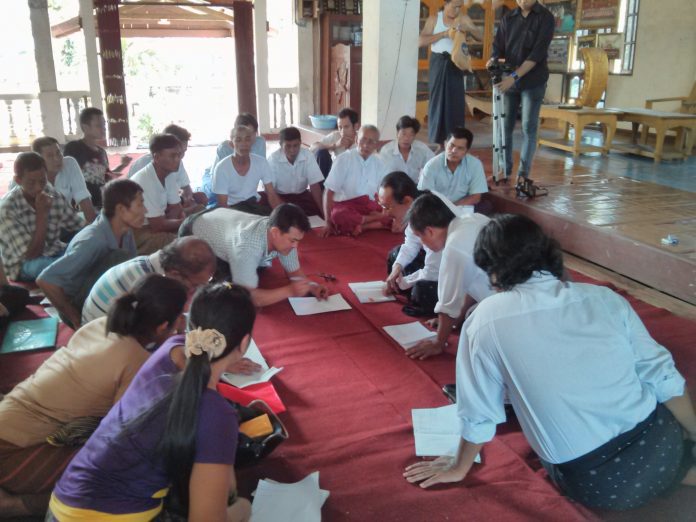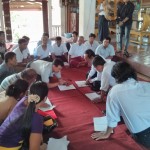expressed their dismay at having been forced to accept compensation at under-market price for lands confiscated by the military government.
In efforts to gather facts surrounding land grabs and seizures in Mon and Karen states, the farmers’ affairs committee, comprised of eight members lead by Ko Tun Myint Aung, arrived in Ye Town on August 18-19th to meet with local farmers, whereupon the committee learned of farmers having been forced to accept unfair compensation for their lands.
“They [the army] invited orchard owners [to receive] compensation. When we, orchard owners, got there, we got to provide signatures for the compensation; given paper [sheets] and pens, we were forced to sign. Now, they [the military] give reason with the given signatures, saying that we provided our signatures. That’s right we gave our signatures, but we did that without willingness. If we did not give our signatures, we were threatened that we would face something, so we gave our signatures,” said U Khan Ngwe, whose orchard was seized for the Light Infantry Battalion (LIB) No. 343 base located near Ah-yuu-daung, Ye Township.
According to another plantation owner, whose land was seized for LIB No. 583, located near Kyaung-ywa Village, Ye Township, “The compensation was with the rate of 100 kyat per acre, and we only got over 1,000 kyat. At the time, in 2001, our orchard was worth more than 1,000,000 kyat.”
Due to land seizures, farmers have become unemployed; some travel to Thailand to find migrant work, while some die from overwhelming grief.
Out of ten townships in Mon State, the largest number of acres seized has been in Ye Township, with a majority of the cases having taken place in 2000 when the military government confiscated orchards, farms, and rubber plantations during the expansion of army bases.
According to the Human Rights Foundation of Monland (HURFOM), the previous military government seized more than 3,000 acres of land in order to construct ten bases, including LIB Nos. 586, 587, 588, 343, 583, and 591.
In a letter sent to the Chairman of the Union Hluttaw (Parliament), President Thein Sein states that more than 350,000 of the 470,000 acres of land confiscated by the government and Tatmadaw (army) across the country are needed for government use, thus the government and army will not release the land.
In concern for farmers who lost their land, and farmers that have been arrested, the 88 generation Peace and Open Society stated on July 24th that arresting farmers and confiscating land is unjust and shows a lack of responsibility from the government.
“If the government is [a] clean government, representing the people, and is the people’s government, it [the government] will return the land to the owners. [For the government] to become clean and [a] people’s government, we are now cooperating for that,” said U Tun Myint, Chairman of the 88 generation Peace and Open Society’s Farmers’ Affairs Committee.
On August 11th the farmers union released a statement maintaining that to resolve the land issues, the government should not accept that providing compensation and returning seized lands will complete its responsibility to the people; rather, it is necessary for the government to provide development projects, or support, which benefit the community.
After gathering facts from across the country, the 88 GOPS’s Farmers’ Affairs Committee plans to release and submit a land issue report to the government, Hlutttaw (Parliament), ethnic armed leaders, and international community organizations, says Ko Tun Myint Aung.


